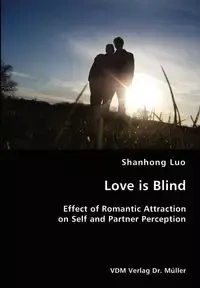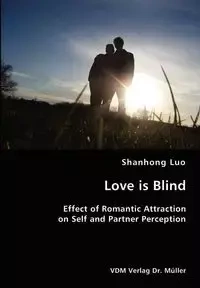Love is Blind- Effect of Romantic Attraction on Self and Partner Perception - Luo Shanhong
Love is Blind- Effect of Romantic Attraction on Self and Partner Perception - Luo Shanhong
AutorzyLuo Shanhong
EAN: 9783836418492
Symbol
406EYV03527KS
Rok wydania
2007
Elementy
76
Oprawa
Miekka
Format
17.0x24.4cm
Język
angielski

Bez ryzyka
14 dni na łatwy zwrot

Szeroki asortyment
ponad milion pozycji

Niskie ceny i rabaty
nawet do 50% każdego dnia
Niepotwierdzona zakupem
Ocena: /5
Symbol
406EYV03527KS
Kod producenta
9783836418492
Autorzy
Luo Shanhong
Rok wydania
2007
Elementy
76
Oprawa
Miekka
Format
17.0x24.4cm
Język
angielski

Love is blind, according to Shakespeare. Everybody would agree with that. But
do we fall in love because we are blind, or does love turn us blind when we are
crazy about someone? Surprisingly little empirical research has been devoted to
testing this important issue explicitly. In this book the author reasons that romantic
attraction is an important motivational force that drives people to
develop biased perceptions of the partner and the self. In other words, it is more
likely that love makes us blind rather than blindness leads to love. In particular, it
is hypothesized that romantic attraction leads to positively biased partner
perceptions (i.e., the positivity bias), enhanced self perceptions, and perceptions
of one's partner as overly similar to one's actual self (i.e., the similarity bias) and
as overly similar to one's ideal self (i.e., the idealization bias). Two experimental
studies were conducted to test these hypotheses. Study 1 used a sample of
individuals who were single and attraction to a bogus partner was manipuated,
whereas Study 2 used individuals who just started dating and attraction to their
real partner was manipulated. Across different samples and different attraction
manipulations, robust and replicable evidence was found that increased attraction
led to the positivity, similarity, and idealization biases. However, attraction
only had weak effects on self perceptions. Additional analyses suggested that
the observed attraction effects could not be accounted for by mood effects.
Implications for conceptualizing the causality link between attraction and
perceptual biases are discussed. This book is addressed to relationship researchers,
marital or family counselors or therapists, and more broadly, to social,
personality, clinical, or developmental psychologists.
EAN: 9783836418492
EAN: 9783836418492
Niepotwierdzona zakupem
Ocena: /5
Zapytaj o produkt
Niepotwierdzona zakupem
Ocena: /5
Napisz swoją opinię

